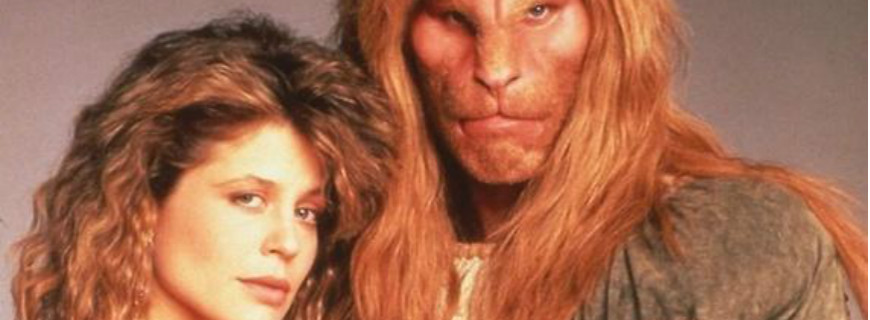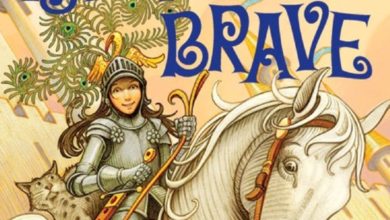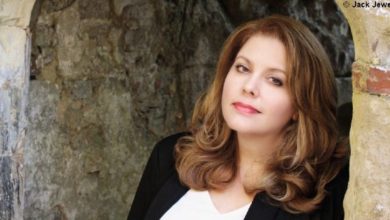Space Oddities: Beauty and the Beast (Alan Cooke, 1987)

Each month, Raz Greenberg reviews an overlooked piece of science fiction, fantasy or horror – be it a film, a television episode, a comic or a game – one that should have gotten more attention when it first came out and should still be remembered, in his opinion. This month, he examines a fine episode from a 1980s fantasy show, written by one of today’s greatest genre writers.
George R.R. Martin is best known today as the writer of the epic fantasy series Song of Ice and Fire adapted into the hit television show Game of Thrones. But Martin’s career as a professional writer dates all the way back to the early 1970s, and in the late 1980s he focused most of his creative attention on writing scripts for television shows. His most prolific output as a screenwriter was done for the fantasy drama Beauty and the Beast, broadcasted between 1987 and 1990. The show followed the relationship that grow into a bound between Catherine (Linda Hamilton), a successful New York attorney and Vincent (Ron Perlman), a monstrous-looking, deformed person, who lives among the outcasts in the city’s sewers.
An interesting hybrid of fairy-tale fantasy and romantic drama, often mixed with elements from crime and courtroom shows, Beauty and the Beast was eventually more successful in concept than execution – the show’s overtly sentimental tone often undermined its attempts at dealing with serious themes (the 2012 remake, starring Kristen Kreuk and Jay Ryan didn’t fare much better). The show did, however, launch the career of several promising writers, notably Howard Gordon who would go on to work on The X-Files, Buffy the Vampire Slayer, Angel (the Buffy-Angel relationship appear to be an element strongly inspired by the Catherine-Vincent relationship*), 24 and Homeland. Martin, who joined the show shortly after making his television writing debut on the 1980s version of The Twilight Zone, has refined much of his familiar writing style while working on the show (read any of his works from before the late 1980s and you’ll find mostly slow-paced, atmospheric pieces; read anything he wrote during and after this period and you’ll find faster-paced writing that has a strong cinematic flavor to it). While writing for the show, Martin also brought to it the familiar recurring theme from his acclaimed literary works: loneliness. His protagonists tend to be lonely people, who deliberately choose to live outside the normative society, preferring the company of themselves to the company of others. In Masques, the fifth episode of the show’s first season, Martin idealizes this choice, while reminding the audience that it has its tragic aspects as well.
The episode takes place in Halloween, the only time of the year when Vincent feels safe walking in the streets, assured that his disfigured face will be mistaken for a mask. While attending a costume party, Vincent befriends Brigit O’Donnell (Caitlin O’Heaney), a peace activist from Northern Ireland who lives under a constant threat for her life. Vincent and Brigit find kindred spirits in each other, as they are both social outcasts, but even the celebrations of Halloween can’t shield them from the ugly and violent reality of their everyday lives.
Game of Thrones (and Song of Ice and Fire) fans will immediately recognize many elements in Masques; a large portion of the episode takes place during the holiday party, a seemingly-cheerful and carefree event for the city’s upper-class society that actually serves as a thin disguise for the tensions, dirty politics and schemes that lay beneath – not unlike some of the notorious social events of Westeros. In the course of the story, Brigit also makes a comment about ancient times, when during Halloween nights “the walls between the worlds grew thin” and “spirits of the underworld walked the Earth”, a description that’s likely to make anyone familiar with Martin’s other work smile.
But Martin’s familiar themes go deeper in the episode. As Vincent’s conversation with Brigit continues, we find out that she has accepted her status as a social outcast – her political activity came at the cost of the life of her lover and the love of her family and her friends, and that she is willing to pay this price in order to fight the good fight. Vincent argues with her, believing that devoting one’s life for a purpose doesn’t have to come at the expanse of social existence, clearly reflecting his deep emotions for Catherine and the hope that one day they will be able to be together. The disillusioned Brigit advices him to choose between normal life (not realizing that while she herself at least had a chance to experience this kind of life, Vincent never did and probably never will) and a grand purpose. The dialogue between the two characters is beautifully-written and every bit as captivating as their later escape, when threats to Brigit’s life become imminent.
Despite being very wordy, Masques is also a very tight story. Taking place in the course of a single night and mostly in a single location, Martin’s script and Alan Cooke’s direction masterfully keep suspense high as a sinister plot against Brigit slowly unfolds. The episode also features strong performances by both Perlman and O’Heaney, who display a great deal of emotional power, even though they spend most the episode’s runtime wearing a mask. It’s truly one of the highlights of Martin’s television career, and it deserves a wider attention from his many fans.
Where to get it: Beauty and the Beast has been released several times on DVD, and it is widely available.
And if you like this…
Be sure to also check out my review of Doorways, a wonderful pilot episode written by Martin for a science fiction show that never got off the ground in SFSignal.
* Special thanks to Assaf Razon for identifying this connection




